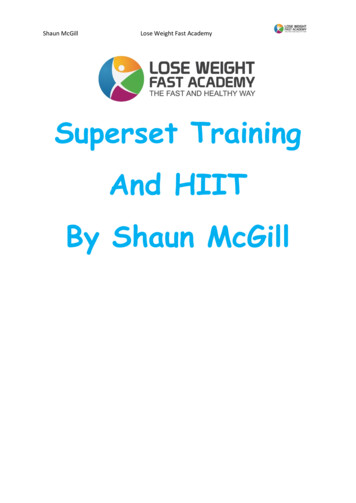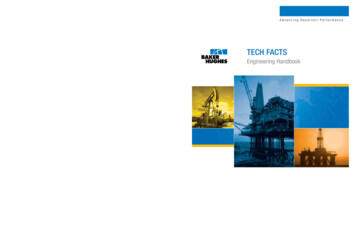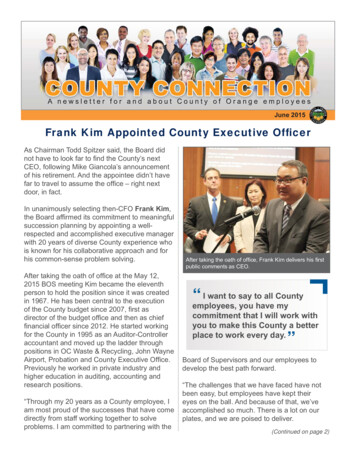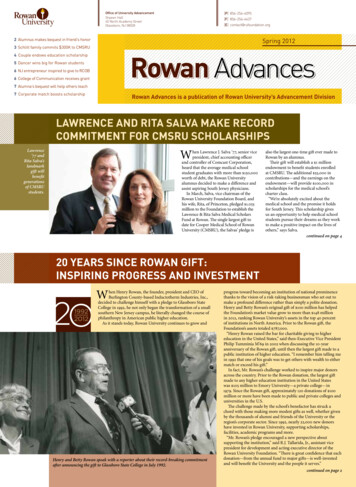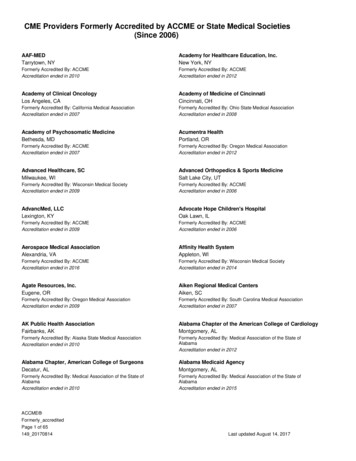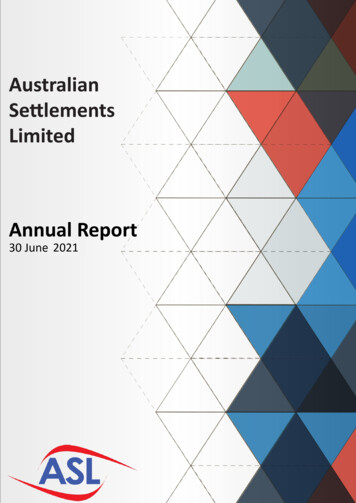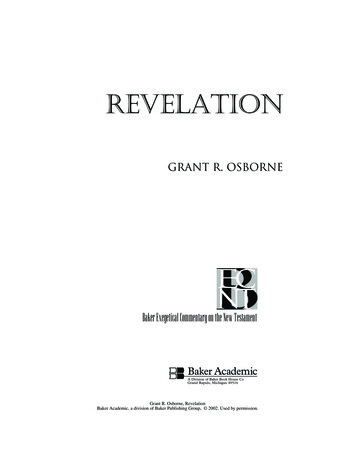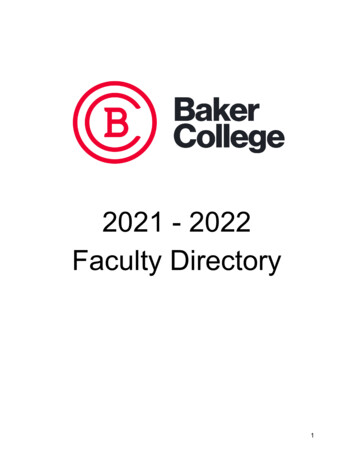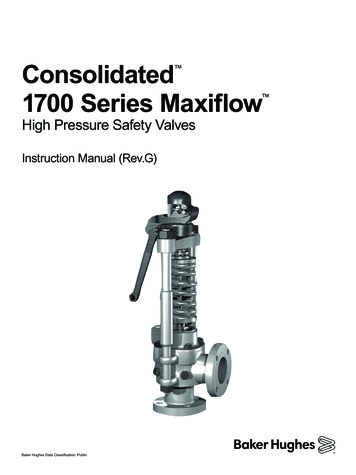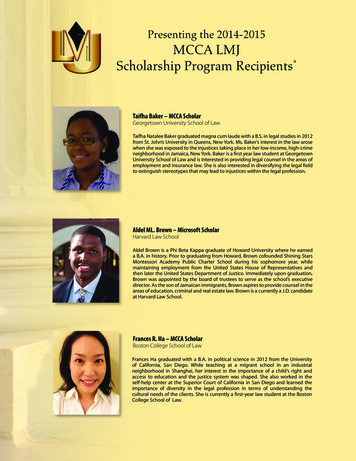
Transcription
Ryan Shaun Baker(formerly Ryan S.J.d. Baker)Graduate School of EducationUniversity of PennsylvaniaPhiladelphia, PA arninganalytics/ryanbaker/CV May 19, 2022RESEARCH INTERESTSEducational Data Mining, Learning Analytics, Student Modeling (Disengagement, Affect, RobustLearning, Knowledge, Strategic Behavior, Meta-Cognition), Intelligent Tutoring Systems,MOOCs, Serious Games/Educational Games, Science Microworlds, Longitudinal Success,Prediction Modeling, Cultural Factors, Learner-Computer InteractionEDUCATIONScB. Computer Science. Brown University. Graduated with Honors in Computer Science, May2000.M.S. Human-Computer Interaction. Carnegie Mellon University. Conferred August 9, 2005.Ph. D. Human-Computer Interaction. Carnegie Mellon University. Conferred on December 22,2005. Advisors: Kenneth R. Koedinger, Albert T. CorbettExecutive Education. Innovation and Entrepreneurship at Columbia Business School(IE@Columbia). Spring 2016.CURRENT APPOINTMENTAssociate Professor. Graduate School of Education. University of Pennsylvania. Summer 2016present. Also Director of Penn Center for Learning Analytics. Secondary appointment inComputer and Information Science.OTHER CURRENT POSITIONSEditor. Computer-Based Learning in Context. 2018-Present.Associate Editor. Journal of Educational Data Mining. 2008-Present.Honorary Fellow. University of Edinburgh Moray House School of Education and Sport. 2016Present.Research Fellow. LINK Lab, University of Texas at Arlington. 2017-Present.PRIOR PROFESSIONAL EXPERIENCEHonorary Adjunct Associate Professor. Department of Human Development. TeachersCollege, Columbia University. 2016-2021.
Affiliate Assistant Professor. Department of Social Science and Policy Studies. WorcesterPolytechnic Institute. Fall 2013-2017.Associate Professor. Department of Human Development. Teachers College, ColumbiaUniversity. Fall 2013-Summer 2016. Also Program Coordinator of MS in Learning Analytics.Julius and Rosa Sachs Distinguished Lecturer. Teachers College, Columbia University. Fall2012- Summer 2013.Assistant Professor of Psychology and Learning Science. Department of Social Science andPolicy Studies. Courtesy Appointment in Computer Science. Worcester Polytechnic Institute. Fall2009 – Fall 2012.Technical Director. Pittsburgh Science of Learning Center DataShop. Carnegie MellonUniversity. Fall 2008 – Summer 2009.Post Doctoral Fellow. Human-Computer Interaction Institute/Pittsburgh Science of LearningCenter. Carnegie Mellon University. Summer 2007 - Summer 2009. Mentor: Vincent AlevenResearch Fellow. Learning Sciences Research Institute. University of Nottingham. Spring 2006– Spring 2007. Mentor: Shaaron Ainsworth.Post Doctoral Fellow. Human-Computer Interaction Institute. Carnegie Mellon University.Winter 2006.Graduate Research Assistant/ Graduate Fellow. Human-Computer Interaction Institute.Carnegie Mellon University. Advisors: Kenneth R. Koedinger, Albert T. Corbett. Fall 2000 – Fall2005.Undergraduate Research Assistant. JDSL (Data Structures Library in JAVA) Project.Computer Science Department. Brown University. Advisor: Roberto Tamassia. Summer 1997 –Spring 2000.Research Assistant. LARC (LAboratory for Recreational Computing) Games Lab. ComputerScience Department. University of North Texas. Advisor: Ian Parberry. Summer 1995– Spring1996.Educational Software Developer. Office of Education. Superconducting Super ColliderLaboratory. Managers: Sam Kivlighn, Tom Gadsden. Summer 1992– Spring 1994.AWARDSBest Paper Award. 22nd International Conference on Artificial Intelligence in Education, 2021.Honorable Mention. MIDAS Reproducibility Challenge. Michigan Institute for Data Science,2020. For work with Christopher Brooks and Josh Gardner.
Prof. Ram Kumar Educational Data Mining Test of Time Award. International EducationalData Mining Society, 2020. For work with Kalina Yacef.Best Paper Award. 9th International Conference on Learning Analytics and Knowledge, 2019.Educational Research Award. Council of Scientific Society Presidents. 2018.Best Student Paper Award (as co-author with Anthony Botelho). 11th International Conferenceon Educational Data Mining, 2018.Best Student Paper Award (as co-author with Yang Jiang). 19th International Conference onArtificial Intelligence in Education, 2018.Best Paper Award. 24th Conference on User Modeling, Adaptation, and Personalization, 2016.Best Student Paper Award (as co-author with Shimin Kai). 8th International Conference onEducational Data Mining, 2015.Best Paper Award. 17th International Conference on Artificial Intelligence in Education, 2015.Best Technical Paper Award. 5th International Conference on Learning Analytics, 2015.Attendee Choice Award for Most Original Research. 10th Annual Games Learning SocietyConference Poster Session, 2014.Best Paper Award. 11th International Conference on Intelligent Tutoring Systems, 2012.James Chen Best Student Paper Award (as co-author with Michael Sao Pedro). 20thInternational Conference on User Modeling, Adaptation, and Personalization, 2012.AERA SIG-ATL Best Student Paper Award (as co-author with Michael Sao Pedro). AnnualMeeting of the American Educational Research Association, 2012.Nomination for Teaching Award. Romeo L. Moruzzi Young Faculty Award for Innovation inUndergraduate Education, Worcester Polytechnic Institute. 2011.People’s Choice Award for Best Oral Presentation. 10th International Conference on IntelligentTutoring Systems, 2010.People’s Choice Award for Best Interactive Event. 10th International Conference on IntelligentTutoring Systems, 2010.Best Paper Award. 8th International Conference on Intelligent Tutoring Systems, 2006.Senior Prize in Computer Science. Brown University, 2000.GRANTS, PROJECT AWARDS, AND FELLOWSHIPS
National Science Foundation, EHR Core Research (ECR). Collaborative Research:Investigating Gender Differences in Digital Learning Games with Educational Data Mining.Baker, R.S. (PI). July 2022-May 2025. 213,887. (collaborative award with four other institutions– total 1.5M). Award #DRL-2201798.National Science Foundation, Improving Undergraduate STEM Education (IUSE).Grappling with Graphs: New Tools for Improving Graphing Practices of Undergraduate BiologyStudents. Gardner, S. (PI), Baker, R.S. (Co-PI). August 2021 – July 2025. 1,566,948. Baker,R.S. (subcontract lead). August 2021 – July 2025. 222,451.Schmidt Futures Foundation. Instrumenting the RealizeIt Platform. Kizilcec, R. (PI), Baker,R.S. (Co-PI). March 2021 – February 2023. 215,000 (total grant across institutions 500,000).National Science Foundation, EHR Core Research (ECR). Collaborative Research: ExploringAlgorithmic Fairness and Potential Bias in K-12 Mathematics Adaptive Learning. Ocumpaugh, J.(PI), Baker, R.S. (Co-PI). October 2020 – September 2023. 512,985. (collaborative award withone other institution – total 1.5M). Award #DUE-2000405.New Schools Venture Fund, EF Math Program. Making learning visible: scalable, multisystem detection of self-regulation related to EF. Baker, R.S. (PI). April 2020 – September 2023. 899,702.National Science Foundation, Improving Undergraduate STEM Education. Understandingand Enhancing Self-Regulated Learning in Introductory Computer Science Courses. Fouh, E.M.(PI), Baker, R.S. (Co-PI). December 2019-November 2022. 300,000. Award #DUE-1946150.National Science Foundation, Cyberinfrastructure for Sustained Scientific Innovation.Collaborative Research: Frameworks: Cyber Infrastructure for Shared Algorithmic andExperimental Research in Online Learning. October 1, 2019 – September 30, 2024. 1,399,995.(collaborative award with one other institution – total 3.3M). Award #DRL-1931419.Schmidt Futures Foundation. Customizing a Digital Learning Platform for Rapid, Low-CostResearch. Baker, R.S. (subcontract lead). August 14, 2019 – July 31, 2022. 100,000.National Science Foundation, Discovery Research PreK-12. Collaborative Research:Developing an Online Game to Teach Middle School Students Science Research Practices in theLife Sciences. Baker, R.S. (PI). September 2019-August 2023. 447,009 (collaborative awardwith two other institutions – total 3.0M). Award #DRL-1907437.National Science Foundation, Cyberlearning. Collaborative Research: Student AffectDetection and Intervention with Teachers in the Loop. Baker, R.S. (PI). September 2019-August2022. 235,513 (total grant across institutions 730,437). Award #IIS-1917545.Office of Naval Research. Toward Learning Analytics on US Navy Training Data. Baker, R.S.(PI). September 2017-August 2018. 99,972. Award #N0014-17-1-2662.National Science Foundation, Discovery Research PreK-12. Collaborative Research: UsingEducational Data Mining Techniques to Uncover How and Why Students Learn from ErroneousExamples. Baker, R.S. (PI). June 2017-December 2022. 584,644 (total grant across institutions 1,498,736). Award #DRL-1661121.
U.S. Department of Education, Institute of Education Sciences. Using Automating Detectorsof Engagement to Identify Malleable Factors in Blended Learning Environments. Heppen, J. (PI),Baker, R.S. (Co-PI). July 2017-June 2021. 1,399,999. Award #R305A170167. Subcontract toUPenn: Using Automating Detectors of Engagement to Identify Malleable Factors in BlendedLearning Environments. Baker, R.S. (subcontract lead). July 2017-June 2021. 390,157.U.S. Department of Education, Institute of Education Sciences.Exploring Adaptive Cognitive and Affective Learning Support For Next-Generation STEMLearning Games. Shute, V. (PI), Baker, R.S. (Co-PI). July 2017-June 2021. 1,399,996. Award#R305A170376. Subcontract to UPenn: Exploring adaptive cognitive and affective learningsupport for next-generation STEM learning games. Baker, R.S. (subcontract lead). July 2017June 2021. 429,826.National Science Foundation, Cyberlearning and Future Learning Technologies. EXP:Linguistic Analysis and a Hybrid Human-Automatic Coach for Improving Math Identity.Ocumpaugh, J.L. (PI), Baker, R. S. (Co-PI) 2016-2020. 540,047. Award #DRL-1739012.National Science Foundation, Big Data Regional Innovation Hubs. BD Spokes: Spoke:NORTHEAST: Collaborative: Grand Challenges for Data-Driven Education. Baker, R. S. (PI)2016-2019. 224,999. (Total grant across 3 institutions 979,097). Award #DRL-1661987.National Science Foundation, EHR Core Research. Collaborative Research: Using DataMining and Observation to derive an enhanced theory of SRL in Science learning environments.Baker, R. S. (PI) 2016-2021. 1,492,122. Award #DRL-1561567.U.S. Army Research Laboratory. Integrating edX, GIFT, and CTAT. Aleven, V. (PI), Baker,R.S. (Co-PI). 2016-2019. 650,757.Classba, Inc. Classba Research Lab on Adaptive Learning at Teachers College, ColumbiaUniversity. Baker, R.S. (PI) 2015-2016. 108,851.National Science Foundation, EHR Core Research. Collaborative Research: The Downside ofPerseverance – Investigating and Moving Students Beyond Unproductive Persistence.Schechtman, N. (PI). Baker, R.S. (TC PI). 2015-2019. 399,411. (Total grant across 3 institutions 1,516,281). Award #DRL-1535340.Bill and Melinda Gates Foundation. Digital Learning Research Network. Siemens, G. (PI).Baker, R. (Project member). 2015-2016. 1,600,000.Subcontract to TC: Digital Learning Research Network. Baker, R.S. (subcontract lead).2015-2016. 206,000.National Science Foundation, Data Intensive Research to Improve Teaching and Learning –An Ideas Lab to Foster Transformative Approaches to Teaching and Learning.Collaborative Research: Modeling Social Interaction and Performance in STEM Learning.Bergner, Y. (PI). Baker, R.S. (Co-PI). 2014-2017. 774,447. Award #DRL-1418378.Subcontract to TC: Collaborative Research: Modeling Social Interaction andPerformance in STEM Learning. Baker, R.S. (subcontract lead). 2014-2017. 185,320.Bill and Melinda Gates Foundation (via Athabasca University). MOOC Learner Motivationand Course Completion Rates. Wang, Y.E. (PI), Baker, R.S.J.d. (Co-PI). 2013-2014. 15,000.
National Science Foundation, Research on Education and Learning (REAL). Making MathTutors More Engaging and Effective through Interaction Design Patterns and Educational DataMining. Baker, R.S.J.d. (PI). September 2013 – August 2017. 1,480,949. Award #DRL1252297.U.S. Army Research Laboratory. Detection and Transition Analysis of Engagement and Affectin a Simulation-Based Combat Medic Training Environment. Baker, R.S.J.d. (PI). 2012-2015. 958,093. Award #W911NF-13-2-0008.Bill and Melinda Gates Foundation, US Programs, Log File and Valence Studies ofEducation. Modeling how Affect, Engagement, and Conscientiousness Interact and InfluenceLearning in Newton’s Playground. Baker, R.S.J.d. (PI). 2012-2014. 673,378. Award#OPP1060038.U.S. Department of Education, Institute of Education Sciences. The Development of aPedagogical Agent for Physical Science Inquiry Driven by Educational Data Mining. Gobert, J.G.(PI), Baker, R.S.J.d. (Co-PI). July 2012-June 2015. 1,499,772. Award #R305A120778.Subcontract to TC: The Development of a Pedagogical Agent for Physical ScienceInquiry Driven by Educational Data Mining. Baker, R.S.J.d. (subcontract lead). July2012-June 2015. 304,679.Bill and Melinda Gates Foundation, US Program, Vital Behaviors and Skills Associatedwith Engagement Derived from Learning Analytics Topic. Towards an EngagementPedometer for Everyone: Unobtrusive Assessment of Engagement and Disengagement. Baker,R.S.J.d. (PI). 2011-2013. 277,044. Award #OPP1048577.National Science Foundation, Software and Hardware Foundations (SHF). SHF: Small: UserStudies to Improve Novice Programming. Fisler, K. (PI), Baker, R.S.J.d. (Co-PI). 2011-2014. 261,561. Award #CCF-1116539. REU Supplement 16,000.U.S. Department of Education, Institute of Education Sciences. Classroom Environment,Allocation of Attention, and Learning Outcomes in K-4 Students. Fisher, A. (PI), Baker, R.S.J.d.(Co-PI). 2011-2015. 1,571,973. Award #R305A110444.Subcontract to WPI: Classroom Environment, Allocation of Attention, and LearningOutcomes in K-4 Students. Baker, R.S.J.d. (subcontract lead). 2011-2015. 326,099.( 66,211 spent before transfer to TC)Subcontract to TC: Classroom Environment, Allocation of Attention, and LearningOutcomes in K-4 Students. Baker, R.S.J.d. (subcontract lead). 2011-2015. 259,888.National Science Foundation, Innovative Technology Experiences for Students andTeachers (ITEST). Research: Predicting STEM Career Choice from Computational Indicators ofStudent Engagement within Middle School Mathematics Classes. Baker, R.S.J.d. (PI), Heffernan,N.T. (Co-PI). June 2011 – May 2016. 711,609. Award #DRL-1031398.Subcontract to TC: Research: Predicting STEM Career Choice from ComputationalIndicators of Student Engagement within Middle School Mathematics Classes. Baker,R.S.J.d. (PI). 2012-2014. 366,210.National Science Foundation, Research and Evaluation on Education in Science andEngineering (REESE). Empirical Research: Emerging Research: Using Automated Detectors toExamine the Relationships Between Learner Attributes and Behaviors During Inquiry in Science
Microworlds. Gobert, J.G. (PI), Baker, R.S.J.d. (Co-PI). October 2010 – September 2015. 986,111. Award #DRL-1008649.Subcontract to TC: Empirical Research: Emerging Research: Using AutomatedDetectors to Examine the Relationships Between Learner Attributes and BehaviorsDuring Inquiry in Science Microworlds. Baker, R.S.J.d. (subcontract lead). 2012-2013. 79, 566.National Science Foundation, Research and Evaluation on Education in Science andEngineering (REESE). Empirical Research: Emerging Research: Robust and Efficient Learning:Modeling and Remediating Students’ Domain Knowledge. Corbett, A.T. (PI), Baker, R.S.J.d.(Co-PI). July 2009 – June 2013. 1,066,102. Award # DRL-0910188.Subcontract to WPI: Empirical Research: Emerging Research: Robust and EfficientLearning: Modeling and Remediating Students’ Domain Knowledge. Baker, R.S.J.d.(subcontract lead). 2009-2012. 161,781.U.S. Department of Education, Institute of Education Sciences. Promoting RobustUnderstanding of Genetics with a Cognitive Tutor that Integrates Conceptual Learning withProblem Solving. Corbett, A.T. (PI), Baker, R.S.J.d. (Co-PI). 2009-2013. 1,422,468. Award #R305A090549.Subcontract to WPI: Promoting Robust Understanding of Genetics with a CognitiveTutor that Integrates Conceptual Learning with Problem Solving. Baker, R.S.J.d.(subcontract lead). 2009-2012. 265,957.National Science Foundation, Science of Learning Centers. Toward a Decade of PSLCResearch: Investigating Instructional, Social, and Learner Factors in Robust Learning throughData-Driven Analysis and Modeling. Koedinger, K.R. (PI). Baker, R.S.J.d. (Senior Personnel).February 2010- January 2015. 25,000,000. Award # SBE-0836012.Subcontract to WPI: PSLC Projects in Affect Detection and Closing the Loop onGaming the System. Baker, R.S.J.d. (subcontract lead). 2010-2012. 316,960.Subcontract to TC: PSLC Projects in Affect, Gaming the System, and Robust Learning.Baker, R.S.J.d. (subcontract lead). 2012-2013. 144,096.Pittsburgh Science of Learning Center Project Award. Improving Student Affect ThroughAdding Gaming Elements to Mathematics LearnLabs. Aleven, V. (PI). Baker, R.S.J.d. (co-PI).August 2008 - September 2009. 104,901.Pittsburgh Science of Learning Center Project Award. Geometry Greatest Hits. Aleven, V(PI). Baker, R.S.J.d. (co-PI). August 2008 - September 2009. 101,861.Pittsburgh Science of Learning Center Project Award. How Content and Interface FeaturesInfluence Student Choices Within the Learning Space. Baker, R.S.J.d. (PI). July 2007 - July2008. 73,718.Kaleidoscope Initiative. A Centralized Research Data Repository. Melis, E. (PI), Baker, R. (coPI). March-December 2007. 15,000.National Defense Science and Engineering Graduate Fellowship. American Society ofEngineering Education/Department of Defense. Fall 2001- Spring 2004.COURSES TAUGHT
Big Data, Education, and Society. Graduate School of Education, University ofPennsylvania.Fall 2021.Foundations of Teaching and Learning. Graduate School of Education, University ofPennsylvania.Fall 2021.Intelligent Tutoring Systems. Graduate School of Education, University of Pennsylvania.Fall 2020.Core Methods in Educational Data Mining. Graduate School of Education, University ofPennsylvania.Fall 2020.Big Data, Education, and Society. Graduate School of Education, University ofPennsylvania.Spring 2020.Big Data and Education. Taught on edX for University of Pennsylvania.On-demand course starting Fall 2019.Big Data and Education. Taught on edX for University of Pennsylvania.Summer 2019.Core Methods in Educational Data Mining. Graduate School of Education, University ofPennsylvania.Spring 2019.Foundations of Teaching and Learning. Graduate School of Education, University ofPennsylvania.Fall 2018.Big Data and Education. Taught on edX for University of Pennsylvania.Spring 2018.Big Data, Education, and Society. Graduate School of Education, University ofPennsylvania.Spring 2018.Foundations of Teaching and Learning. Graduate School of Education, University ofPennsylvania.Fall 2017.Big Data and Education. Taught on edX for University of Pennsylvania.Summer 2017. Enrollment of 4,230 students at time of course end.Core Methods in Educational Data Mining. Graduate School of Education, University ofPennsylvania.Spring 2017.
Foundations of Teaching and Learning. Graduate School of Education, University ofPennsylvania.Fall 2016.Learning Analytics: Process & Theory. Department of Human Development, Teachers College,Columbia University. Concurrently for Moray House School of Education, University ofEdinburgh. (Co-taught with Dragan Gasevic)Spring 2016.Technology & Human Development. Department of Human Development, Teachers College,Columbia University.Spring 2016Core Methods in Educational Data Mining. Department of Human Development, TeachersCollege, Columbia University.Fall 2015 (student course evals: 4.6/5.0)Big Data and Education. Taught on edX for Teachers College, Columbia University.Summer 2015. Enrollment of 10,348 students at time of course end.Probability and Statistical Inference. Department of Human Development, Teachers College,Columbia University.Spring 2015 (student course evals: 4.6/5.0; 2014 average for this course was 3.5)Feature Engineering Studio. Department of Human Development, Teachers College, ColumbiaUniversity.Spring 2015 (student course evals: 4.3/5.0)Core Methods in Educational Data Mining. Department of Human Development, TeachersCollege, Columbia University.Fall 2014 (student course evals: 3.8/5.0)Data, Analytics, and Learning. Taught on EdX for University of Texas, Arlington, incoordination with George Siemens, Dragan Gasevic, and Carolyn Rosé. Fall 2014.Enrollment of 25,186 students at time of course end.Learning Analytics: Process and Theory. Department of Human Development, TeachersCollege, Columbia University.Spring 2014 (student course evals: 4.7/5.0; univ. average 4.2)Big Data and Education. Taught on Coursera for Teachers College, Columbia University.Fall 2013. Enrollment of 44,151 students (as of 12/12/2013)Feature Engineering Studio. Department of Human Development, Teachers College, ColumbiaUniversity.Fall 2013 (student course evals: 4.5/5.0)Special Topics in Educational Data Mining. Department of Human Development, TeachersCollege, Columbia University.Spring 2013 (student course evals: 4.3/5.0)
Advanced Methods and Analysis for the Learning and Social Sciences. Department ofSocial Sciences and Policy Studies, Worcester Polytechnic Institute.Spring 2012. (student course evals: 4.86/5.0)Cognitive Psychology. Department of Social Sciences and Policy Studies, Worcester PolytechnicInstitute.Fall 2011, A term. (student course evals: 4.13/5.0; univ. avg. for ugrad classes 4.10)Fall 2010, B term. (student course evals: 4.22/5.0; univ. avg. for ugrad classes 4.04)Meta-Cognition, Motivation, and Affect. Department of Social Sciences and Policy Studies,Worcester Polytechnic Institute.Spring 2011. (student course evals: 4.5/5.0; univ. avg. for grad classes 4.22)Educational Psychology. (taught as ISP). Department of Social Sciences and Policy Studies,Worcester Polytechnic Institute.Spring 2011, D term. (student course evals not collected)Fall 2010, A term. (student course evals not collected)Research Methods for the Learning Sciences (taught as ISP). Department of Social Sciencesand Policy Studies, Worcester Polytechnic Institute.Spring 2010, C term. (student course evals: 5.0/5.0; univ. avg. for grad classes 4.20)Learning and Motivation. Co-taught with Vincent Aleven. Human-Computer InteractionInstitute and Department of Psychology, Carnegie Mellon University. Spring 2009.Design e Communicação na Web. (Design and Communication on the Web). Programa de PosGraduação em Engenharia de Software (Software Engineering Post-Graduate Program).Faculdade de Alagoas (Alagoas College). December 2008.Research Methods for the Learning Sciences. Co-taught with Kenneth R. Koedinger. HumanComputer Interaction Institute, Carnegie Mellon University. Spring 2008.Learning and Technology. Co-taught with Claire O’Malley. Learning Sciences ResearchInstitute, University of Nottingham. Spring 2007.Human-Computer Interaction for Computer Scientists. Co-taught with Kenneth R.Koedinger, Jacob Wobbrock, and A. Fleming Seay. Human-Computer Interaction Institute,Carnegie Mellon University. Spring 2004.PUBLICATIONSTotal citations: 22,333 (Google Scholar, March 27, 2022)h-index: 67 (Google Scholar, March 27, 2022)Most cited paper:(Baker & Yacef, 2009)(1,879 citations – Google Scholar, March 27, 2022)(Winner, Prof. Ram Kumar Educational Data Mining Test of TimeAward)
Number of distinct co-authors on published papers: 439Full list of citations per paper: http://scholar.google.com/citations?hl en&user hvs8PEoAAAAJORCID: 0000-0002-3051-3232Journal PapersHutt, S., Baker, R.S., Mogessie, M., Andres-Bray, J.M., Brooks, C. (in press) Controlled Outputs,Full Data: A Privacy-Protecting Infrastructure for MOOC Data. To appear in British Journal ofEducational Technology.Baker, R.S., Nasiar, N., Gong, W., Porter, C. (in press) The impacts of learning analytics and A/Btesting research: a case study in differential scientometrics. To appear in International Journal ofSTEM Education.Belitz, C., Ocumpaugh, J., Ritter, S., Baker, R.S., Fancsali, S.E., Bosch, N. (in press)Constructing Categories: Moving Beyond Protected Classes in Algorithmic Fairness. To appearin Journal of the Association for Information Science and Technology.Baker, R.S., Hawn, M.A. (in press) Algorithmic Bias in Education. To appear in InternationalJournal of Artificial Intelligence and Education.Karumbaiah, S., Baker, R.S., Ocumpaugh, J., Andres, J.M.A.L. (in press) A Re-Analysis andSynthesis of Data on Affect Dynamics in Learning. To appear in IEEE Transactions on AffectiveComputing.Baker, R.S., Boser, U., Snow, E.L. (2022) Learning Engineering: A View on Where the Field isat, Where it’s Going, and the Research Needed. Technology, Mind, and Behavior, 3 (1),https://doi.org/10.1037/tmb0000058Bainbridge, K., Shute, V., Rahimi, S, Liu, Z., Slater, S., Baker, R.S., D’Mello, S.K. (2022) Doesembedding learning supports enhance transfer during game-based learning? Learning andInstruction, 77, 101547.Kang, J., Baker, R., Feng, Z., Na, C., Granville, P., Feldon, D.F. (2022) Detecting thresholdconcepts through Bayesian knowledge tracing: examining research skill development inbiological sciences at the doctoral level. Instructional Science. https://doi.org/10.1007/s11251022-09578-5Zhang, Y., Paquette, L., Baker, R.S., Bosch, N., Ocumpaugh, J., Biswas, G. (2022) How arefeelings of difficulty and familiarity linked to learning behaviors and gains in a complex sciencelearning task? European Journal of Psychology of Education. https://doi.org/10.1007/s10212022-00616-xZhang, Y., Paquette, L., Bosch, N., Ocumpaugh, J., Biswas, G., Hutt, S., Baker, R.S. (2022) TheEvolution of Metacognitive Strategy Use in an Open-Ended Learning Environment: Do PriorDomain Knowledge and Motivation Play a Role? Contemporary Educational Psychology, 69,102064.
Shah, M., Fuller, B., Gouveia, C., Mee, C.L., Baker, R.S., San Pedro, M.O.Z. (2022) NCLEX-RNreadiness: HESI Exit Exam validity and nursing program policies. Journal of ProfessionalNursing, 39, 131-138.Karumbaiah, S., Ocumpaugh, J., Baker, R.S. (2021) Context Matters: Differing Implications ofMotivation and Help-Seeking in Educational Technology. International Journal of ArtificialIntelligence and Education. https://doi.org/10.1007/s40593-021-00272-0Mojarad, S., Baker, R.S., Essa, A., Stalzer, S. (2021) Replicating Studying Adaptive LearningEfficacy using Propensity Score Matching and Inverse Probability of Treatment Weighting.Journal of Interactive Learning Research, 32 (3), 169-203.Godwin, K.E., Seltman, H., Almeda, M., Skerbetz, M.D., Kai, S., Baker, R.S., Fisher, A.V.(2021) The elusive relationship between time-on-task and learning: not simply an issue ofmeasurement. Educational Psychology, 41, 502-519.Baker, R.S., Gasevic, D., Karumbaiah, S. (2021) Four Paradigms in Learning Analytics: WhyParadigm Convergence Matters. Computers & Education: Artificial Intelligence, 2, 100021.Re-published in Chinese translation in Distance Education in China, 12, 38-52.Nawaz, S., Srivastava, N., Yu, J.H., Khan, A.A., Kennedy, G., Bailey, J., Baker, R.S. (2021) HowDifficult is the Task for you? Modelling and Analysis of Students' Task Difficulty Sequences in aSimulation-Based POE Environment. To appear in International Journal of Artificial Intelligenceand Education. o-Mendez, G., Huerta-Pacheco, S., Baker, R.S., du Boulay, B. (2021) Meta-affectivebehaviour within an intelligent tutoring system for mathematics. International Journal ofArtificial Intelligence and Education, 32, 174-195.Zhang, Y., Paquette, L., Baker, R.S., Ocumpaugh, J., Bosch, N., Biswas, G., Munshi, A. (2021)Can strategic behavior facilitate confusion resolution? The interplay between confusion andmetacognitive strategies in Betty's Brain. Journal of Learning Analytics, 8 (3), 28-44.Molenaar, I., Horvers, A., Baker, R.S. (2021) What can Moment-by-Moment learning curves tellabout students' self-regulated learning? Learning and Instruction, 72.Rowe, E., Almeda, M. V., Asbell-Clarke, J., Scruggs, R., Baker, R., Bardar, E., & Gasca, S.(2021). Assessing implicit computational thinking in Zoombinis puzzle gameplay. Computers inHuman Behavior, 120. Asbell-Clarke, J., Rowe, E., Almeda, V., Edwards, T., Bardar, E., Gasca, S., Baker, R.S.,Scruggs, R. (2021). The development of students’ computational thinking practices inelementary- and middle-school classes using the learning game, Zoombinis. Computers in HumanBehavior, 115Owen, V.E., Baker, R.S. (2020) Fueling Prediction of Player Decisions: Foundations of FeatureEngineering for Optimized Behavior Modeling in Serious Games. Technology, Knowledge, andLearning, 25 (2), 225-250.
Fischer, C., Pardos, Z.A., Baker, R.S., Williams, J.J., Smyth, P., Yu, R., Slater, S., Baker, R.,Warschauer, M. (2020) Mining Big Data in Education: Affordances and Challenges. Review ofResearch in Education, 44 (1), 130-160.Crossley, S.A., Karumbaiah, S., Ocumpaugh, J., Labrum, M.J., Baker, R.S. (2020) Predictingmath identity through language and click-stream patterns in a blended learning mathematicsprogram for elementary students. Journal of Learning Analytics.Baker, R.S., Berning, A.W., Gowda, S.M., Zhang, S., Hawn, A. (2020) Predicting K-12 Dropout.Journal of Education For Students Placed at Risk, 25, 28-54.Paquette, L., Ocumpaugh, J., Li, Z., Andres, J.M.A.L., Baker, R.S. (2020) Who’s Learning?Using Demographics in EDM Research. Journal of Educational Data Mining, 12 (3), 1-30.Patikorn, T., Baker, R.S., Heffernan, N.T. (2020) ASSISTments Longitudinal Data MiningCompetition Special Issue: A Preface. Journal of Educational Data Mining, 12 (2), i-xi.Almeda, M.V.Q., Baker,
Graduate School of Education University of Pennsylvania Philadelphia, PA USA . University. Baker, R.S. (PI) 2015-2016. 108,851. National Science Foundation, EHR Core Research. Collaborative Research: The Downside of . US Programs, Log File and Valence Studies of Education. Modeling how Affect, Engagement, and Conscientiousness Interact and .
